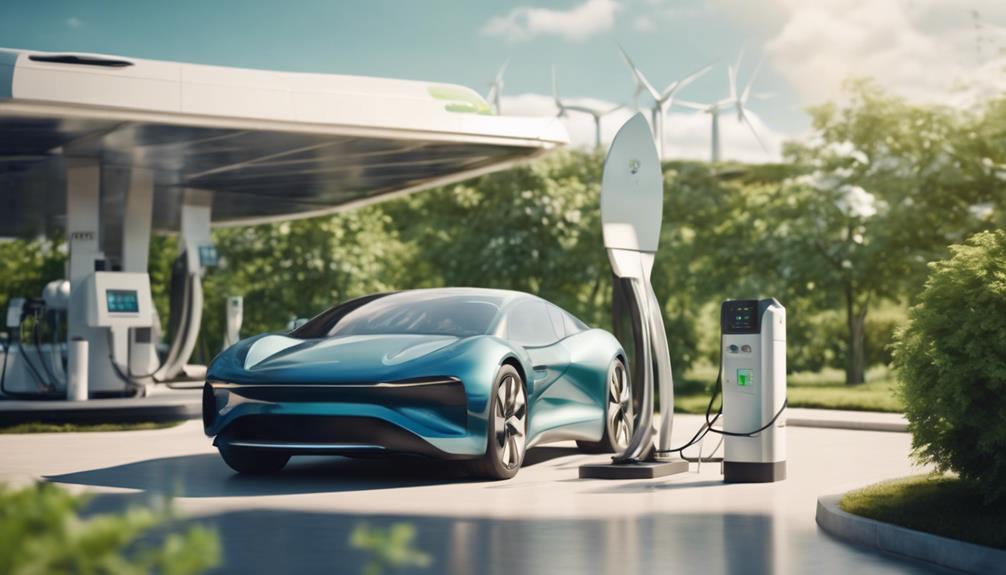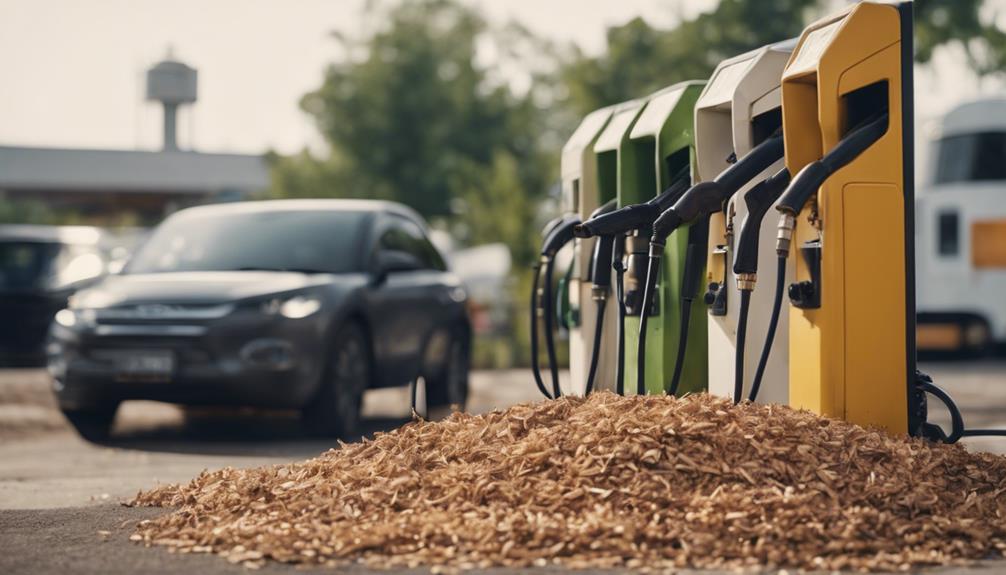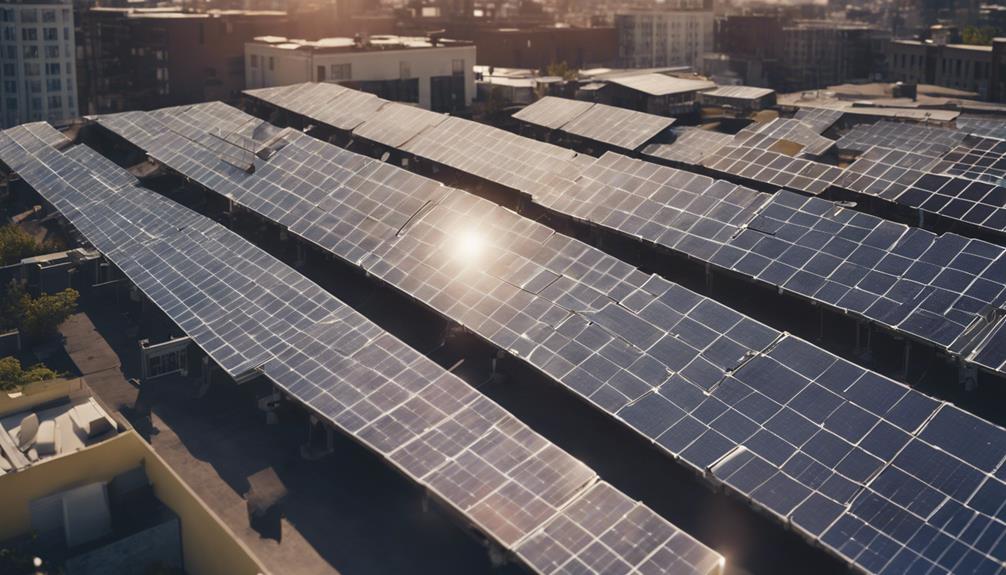Looking to power cars sustainably? Biomass offers a green solution by using organic materials to cut down on emissions and support eco-friendly transportation. It's a win-win for the environment and your daily commute. By tapping into biomass power, you contribute to reducing greenhouse gases and boosting sustainability in the automotive sector. Interested in learning more about how biomass can revolutionize the way we fuel our vehicles?
Key Takeaways
- Biomass can be converted into biofuels for cars, reducing carbon emissions.
- Using biomass for car fuel promotes sustainable energy farming and reduces greenhouse gases.
- Biomass power provides a renewable and cleaner alternative to traditional fossil fuels.
- Biomass energy supports a cleaner environment and enhances energy security for cars.
- Governments endorse biomass as a sustainable solution, driving the shift to renewable energy sources.
Biomass Power Overview
Biomass power, a sustainable energy solution, utilizes perennial biomass for generating electricity and heat. Perennial grasses, such as switchgrass and miscanthus, are favored feedstock sources for biomass power due to their high productivity and resource efficiency. Unlike annual bioenergy crops, these grasses require less input and provide a more pivotal source of energy.
Biomass power is considered carbon-neutral as the carbon dioxide released during energy generation is offset by the carbon dioxide absorbed during the growth of the biomass feedstock. Governments worldwide are increasingly endorsing the use of perennial grasses for biomass power, signaling a shift towards more sustainable energy farming systems.
Currently, biomass power contributes to 0.28% of global electricity generation, highlighting its potential for growth as a renewable and environmentally friendly energy source. By utilizing woody and herbaceous plants as feedstock sources, biomass power plays an essential role in reducing greenhouse gas emissions and promoting a cleaner energy future.
Environmental and Economic Benefits

Shifting towards renewable energy sources like biomass power offers noteworthy environmental and economic benefits for both local communities and global sustainability efforts. Biomass power plays an integral role in reducing carbon dioxide emissions and lowering greenhouse gas emissions, helping combat climate change. By utilizing biomass power as an alternative to traditional energy sources, there's a substantial decrease in carbon footprint, contributing to a cleaner and healthier environment.
The deployment of biomass power not only supports various sectors like education, healthcare, agriculture, and small businesses but also stimulates local economies by creating job opportunities. This shift to renewable energy sources reduces air pollution, enhancing public health and providing improved access to modern energy services, particularly in developing countries.
Governments are increasingly recognizing the environmental and economic benefits of biomass power, leading to the adoption of perennial grasses for future energy farming systems. Despite currently only accounting for 0.28% of global electricity generation, biomass power shows great potential to notably increase its share in the future energy mix.
Individual Actions and Awareness

Consider proactively taking steps towards promoting sustainable energy solutions in your community through individual actions and raising awareness.
One impactful way to contribute is by exploring the benefits of producing perennial biomass, like Woody Biomass, for biofuel production on farmland. By sharing information on biomass energy with local utilities or nonprofit organizations, you can help raise awareness and promote the adoption of Sustainable Energy sources.
Additionally, exploring other Drawdown solutions can enhance your understanding and support overall sustainability efforts, complementing the use of biomass power.
Engaging in discussions about the environmental and economic benefits of biomass power can encourage community support and participation in green initiatives. Understanding the carbon capture potential of biomass and its role in reducing greenhouse gases to combat climate change effectively is crucial.
Economic Impact and Policy Support

To drive the widespread adoption of biomass power for cars, it's necessary to understand the economic impact and policy support necessary for sustainable energy development.
Government incentives, subsidies, and supportive policies, as recommended by the Department of Energy and the National Renewable Energy Laboratory, play a vital role in accelerating the shift towards renewable energy sources like biomass. These regulations and frameworks not only foster renewable energy development but also drive investments in clean energy infrastructure, reducing carbon emissions from traditional fuels.
Switching to biomass power can lead to cost savings and enhanced energy security for car owners, making it a financially viable and environmentally friendly option. Additionally, the installation, operation, and maintenance of biomass power systems create job opportunities, supporting economic growth.
Future Trends and Considerations

Anticipating evolving technological advancements and global energy demands, the future of biomass power for cars presents intriguing possibilities and challenges. As clean wind and solar power become more prevalent, the need for biomass power in certain regions may diminish. However, the decreasing installation costs of biomass power systems make them more economically viable, fostering their future adoption. International collaboration is essential to achieve global renewable energy objectives, particularly in the sustainable utilization of biomass for automotive purposes. Biomass power not only aids in reducing greenhouse gas emissions compared to fossil fuels but also contributes significantly to combating climate change. Government support through incentives and policies is crucial for expediting the integration of biomass power into sustainable transportation networks.
| Future Trends and Considerations | |
|---|---|
| Processes to Produce | Biomass conversion technologies continue to evolve, enhancing efficiency and reducing emissions. |
| Used to Produce | Biomass feedstocks like agricultural residues, forest residues, and energy crops are utilized for sustainable power generation. |
| Amount of CO | Biomass power notably reduces CO2 emissions, aiding in the fight against climate change. |
| Global Energy | The global shift towards renewable energy sources underscores the importance of biomass in the future energy landscape. |
| Engine Operation | Advances in engine technology are optimizing the use of biomass power for improved efficiency and performance. |
Biomass Overview and Carbon Removal Potential

The intrinsic value of biomass lies in its capacity to facilitate carbon removal from the atmosphere, making it a pivotal resource in combating climate change. Biomass, sourced from living organisms such as trees and plants, plays a vital role in carbon-negative initiatives.
Through BiCRS pathways like gasification and fermentation, carbon can effectively be captured and sequestered from biomass, aiding in greenhouse gas reduction efforts. In the U.S. alone, BiCRS has the potential to remove a substantial 884 million tons of CO2 annually, contributing significantly to carbon removal strategies.
To achieve carbon-negative outcomes, it's essential to prioritize sustainable biomass sourcing, focusing on wastes and residues. Additionally, sustainable agricultural practices are instrumental in utilizing biomass for carbon removal while promoting ecosystem health.
Frequently Asked Questions
Can Biomass Be Used to Power Cars?
Yes, biomass can indeed power cars. Biofuels derived from biomass, such as ethanol and biodiesel, offer a renewable and sustainable option for vehicle fuel. These biofuels can be used in standard car engines without requiring any modifications.
Is Biomass a Sustainable Energy Option?
When considering sustainability, biomass power shines. It currently contributes 0.28% of global electricity and could prevent 2.62-3.59 gigatons of CO2 emissions by 2050. So, yes, biomass is a promising sustainable energy option.
What Is Biomass for Sustainability?
Biomass for sustainability involves utilizing organic materials like perennial grasses and wood to generate electricity and heat. It helps achieve net-zero emissions by trading in existing carbon and avoiding new emissions, contributing to a greener future.
Are Biomass and Biodiesel Truly Sustainable?
Are biomass and biodiesel truly sustainable? Yes, they offer renewable and eco-friendly fuel options. By using sustainable sourcing and production methods, these fuels can reduce greenhouse gas emissions, decrease reliance on fossil fuels, and promote a cleaner transportation sector.
How Does Biomass Power Cars and Boilers in a Sustainable Way?
Biomass boilers for sustainable energy power cars and boilers by burning organic materials like wood and agricultural waste. The process releases carbon dioxide, but it is offset by the carbon absorbed during the growth of the biomass. This creates a closed carbon cycle, making it a sustainable energy source.
Conclusion
To sum up, biomass is a bright, bountiful solution for powering cars sustainably. By harnessing the power of organic matter, we can reduce carbon emissions and support a cleaner, greener future.
Take action today to make a positive impact on the environment and drive change for tomorrow. Let's embrace biomass as a brilliant, beneficial option for fueling our vehicles and protecting the planet.









